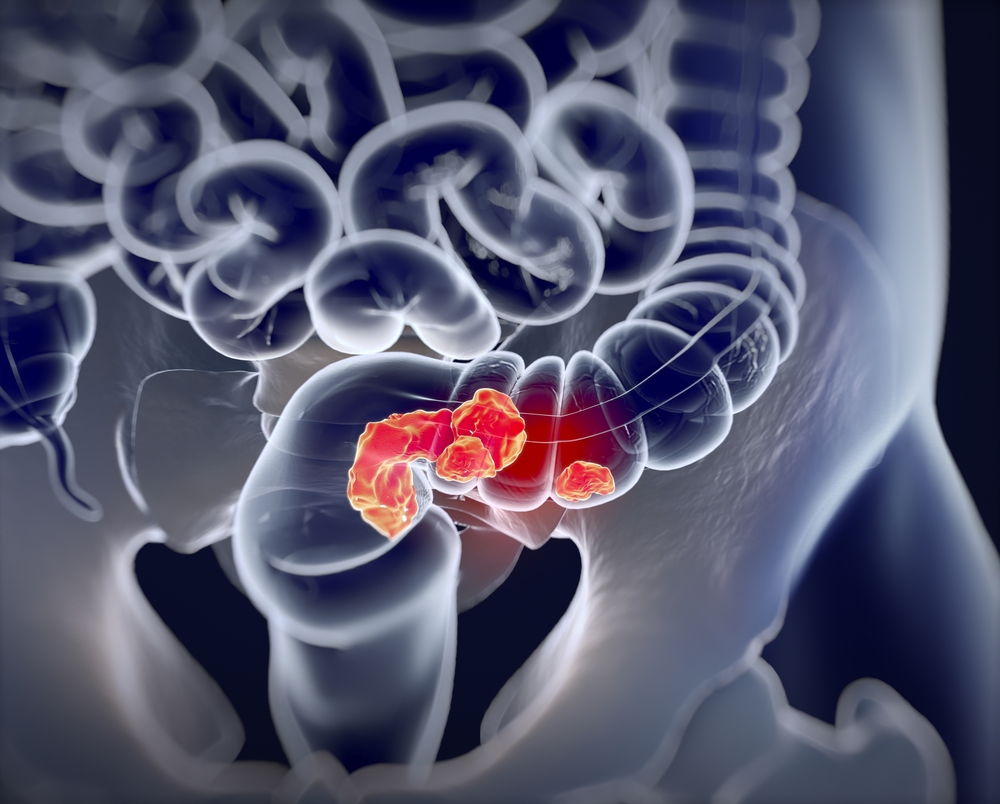Colorectal cancer begins in the colon or rectum and can also be named colon or rectal cancer on the basis of its origin.
The colon or large intestine is the final area of the digestive tract where food gets digested into a simpler form, before excreting out the waste material through the rectum. The colon is a 5-6 foot long tube which connects the small intestine to the rectum. Continue reading to find out more about how colorectal cancer develops.
Colon cancer usually occurs in old age and begins as benign tumours or polyps inside the colon. Polyps generally do not produce any symptoms and thus, colon cancer is mostly detected by regular screening. Most colorectal cancers are adenocarcinomas, while a few may be carcinoid tumours, gastrointestinal stromal tumours, lymphomas or sarcomas.
Signs and symptoms
In most cases, the symptoms do not occur until the cancer has progressed to an advanced stage. However, the following are some of the signs and symptoms which may indicate the occurrence of colorectal cancer;
- Rectal bleeding or reddish stool due to the presence of blood in stool
- Stringy pencil stools
- Abdominal pain such as cramps or bloating
- Weakness or fatigue
- Frequent change in bowel habits i.e. diarrhoea, constipation
- Weight loss without any other reason
- Tenesmus, i.e. feeling of not emptying bowel completely
- Anaemia caused due to deficiency of iron
All these symptoms may also occur due to other conditions such as ulcers, haemorrhoids or Crohn’s disease. Further examination by a physician is a must to diagnose cancer.
Causes and Risk Factors of Colorectal Cancer
Cancers occur due to mutation in cells which allows cells to grow without any checks and start accumulating to form tumours. Cancerous cells lose their ability to adhere to membranes and acquire the ability to metastasize to newer locations, thereby spreading cancer.
Some of the major risk factors which increase the chances of cancer include;
- Age: The risk of colon cancer increases as a person ages. The average age at the time of diagnosis of colon cancer in men is 68, while that for women is 72.
- African-American origin: African-American people have a 20% more risk of developing colorectal cancer.
- History of polyps or colorectal cancer: The presence of non-cancerous polyps and tumours increases the risk of colorectal cancer.
- Inflammatory conditions in the intestine i.e. ulcerative colitis, and Crohn’s disease also increases the risk.
- Certain hereditary conditions such as familial adenomatous polyposis (FAP) and Lynch syndrome, as well as family history of the disease, increase the risk of colorectal cancer.
Other risk factors include dietary habits with excess consumption of fats and low consumption of dietary fibre, obesity, alcohol consumption, diabetes, smoking, and a sedentary lifestyle.
Not all polyps lead to the development of cancer. If there are more than 3 polyps, or the size of the polyp is more than 1 cm or, the area surrounding the polyp looks abnormal, it increases the chance of cancer.
Prevalence in Asian Countries
Colorectal cancer ranks third (10.2% of total cancer cases) as the most diagnosed cancer, throughout the world. Asia contributes to the highest incidents of colorectal cancer (51.8%) and the highest mortality due to cancer (52.4%) in the world. China, Japan, Korea, Malaysia, Singapore and Turkey account for the highest cases among Asian countries.
Diagnosis
Physical examination: The doctor will examine the abdominal area for lumps or enlarged organs. They may even prescribe a digital rectal exam where a lubricated tube is inserted inside the rectum to look for any abnormal areas.
Colonoscopy: A thin tube with a camera and light is inserted into the anus and rectum to look through the large intestine. The camera captures images of your intestine.
Biopsy: A sample of tissue can be obtained during colonoscopy or surgery to analyse for cancer.
Faecal occult blood tests: Lab test to check stool samples for hidden blood
Faecal DNA tests: DNA test of stool to diagnose colorectal cancer in patients with no symptoms.
Flexible sigmoidoscopy: Similar to colonoscopy, this method uses a flexible narrow tiny tube with a camera over it to look inside the rectum or colon.
Barium enema: This method is less expensive than a colonoscopy and helps in the detection of polyps, or tumours through x-ray.
CT colonography (virtual colonography): A minimally invasive technique to detect colorectal cancer. Special x-rays are used to examine the colon and large intestine.
Treatment & Prevention
Surgery: In the case of early-stage cancer minimal invasive methods are used to perform surgery. Small polyps or tumours can be removed during colonoscopy, whereas larger tumours can be removed through endoscopic mucosal resection. Polyps which cannot be removed by colonoscopy can be removed by laparoscopic surgery.
In case cancer has advanced, the treatment requires stringent surgery. Part of the affected colon and some normal tissues are removed through partial colectomy. This process can also be done laparoscopically and the surgeon is able to reconnect healthy parts of the colon. Other surgeries involve the removal of lymph nodes or ostomy.
Radiotherapy: X-rays are used to destroy cancerous cells. Radiotherapy is not a common method for colon cancer and is mostly used for rectal cancer. There are two types of radiotherapy i.e. internal or external beam radiotherapy.
Chemotherapy: Single or multiple drugs are used to treat colon cancer. Commonly used drugs are Capecitabine, fluorouracil, and oxaliplatin.
Immunotherapy: Immunotherapy uses the body’s natural immune defence to treat cancer. Drugs known as checkpoint inhibitors are used to activate patients’ natural immunity. Common drugs include Pembrolizumab, nivolumab, and ipilimumab. Immunotherapy may have serious side effects in case the body starts attacking its own healthy cells.
Cancer can be prevented by changing lifestyle to incorporate activity in daily life, eating a balanced diet, and avoiding smoking and overconsumption of alcohol. Screening for colon cancer for early diagnosis can also help in preventing cancer from reaching advanced stages.










